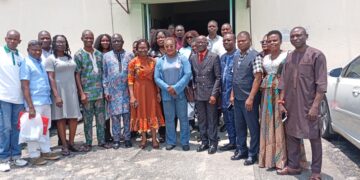By Asuquo Cletus
Cochrane Nigeria has called on journalists to strengthen their role in the fight against cholera by ensuring accurate, timely and impactful reporting that can save lives.
The charge was made during a media roundtable on cholera held yesterday at the Institute of Tropical Diseases Research and Prevention in Calabar.
In her opening remarks, Professor Angela Oyo-Ita said the roundtable was aimed at bridging the gap between health research and media reportage on cholera.
She stressed that while health experts have continued to generate knowledge and interventions, the media remained critical in shaping public perception and mobilising communities to take preventive measures.
According to her, “This roundtable is not just another seminar. It is about empowering journalists to understand the science of cholera and use their platforms to trigger community action. We know that information, if wrongly reported, can cost lives. But when it is accurate and compelling, it saves lives.”
Oyo-Ita also warned against sensational reporting, urging journalists to “avoid panic-driven headlines” and instead promote public trust in health authorities. “The way the media frames cholera determines whether the public takes the right preventive steps or dismisses the warnings. Responsible journalism is therefore a form of public health intervention,” she added.
Delivering a lecture titled “An Overview of Cholera”, Dr. Ekong Udoh highlighted the causes, symptoms and rapid spread of the disease, warning that Nigeria must scale up surveillance and awareness to reduce fatalities.
He explained that cholera thrives in poor sanitation and unsafe water conditions, which remain common in many parts of the country. “What makes cholera deadly is how quickly it dehydrates the body. Within hours, a healthy individual can deteriorate. That is why communities need early detection, immediate rehydration, and, most importantly, prevention through clean water,” he said.
Udoh also called for government investment in water and sanitation infrastructure. “We cannot continue to treat cholera as an annual emergency. It must be treated as a long-term development challenge. Unless we fix water supply and waste disposal, outbreaks will keep recurring,” he emphasised.
Also speaking, Dr. Dachi Arikpo underscored the importance of continuous public sensitisation, noting that journalists are key partners in translating scientific information into accessible language that the general public can act upon.
“Cholera control is not just about medicine; it is about knowledge transfer. Researchers can generate data, but if the community does not hear it in the right language, it is wasted. That is where the journalist comes in—turning research into action at the grassroots,” Arikpo said.
He further urged newsrooms to sustain coverage beyond outbreak seasons. “The media should not only report when cholera kills people. Coverage should be year-round—on hygiene, hand-washing, safe water, and government accountability. That way, prevention becomes part of daily life, not just a reaction to crisis,” he added.
Cochrane, an international non-profit organisation with centres and affiliates around the world, works to make up-to-date information about healthcare interventions available to improve decision-making. Cochrane Nigeria, which oversees the network’s activities in the country and hosts the West Africa regional office, said it would continue to engage with the media as part of efforts to strengthen public health communication.











